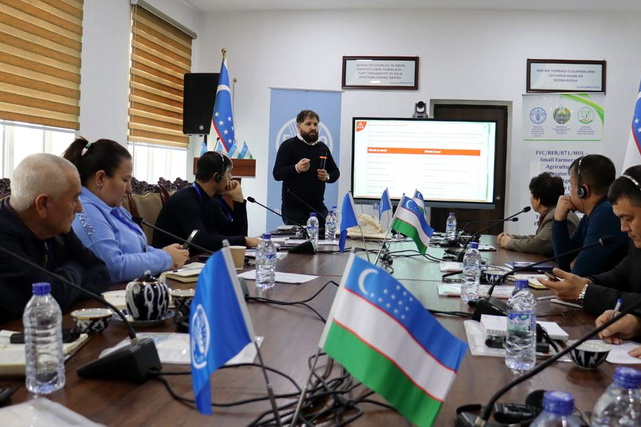
FAO Conducts Training of Master Trainers to Advance Farmer Field Schools in Uzbekistan
FAO Conducts Training of Master Trainers to Advance Farmer Field Schools in Uzbekistan
Tashkent, Uzbekistan (UzDaily.com) — Under the regional project, FVC/RER/071/MUL: Small Farmers as Agricultural Innovators for Resilient Agrifood Ecosystems, the FAO Regional and Country Office organized the first Training of Master Trainers on the Farmer Field School (FFS) approach.
This training focused on the concept, methodology, programming, and implementation aspects of FFS, equipping Master Trainers with the knowledge and skills necessary to establish and sustain these schools effectively.
The event brought together local farmers, community leaders, and international experts, fostering a collaborative learning environment. The training covered essential topics such as the prerequisites for starting FFS, capacity development needs, identification of human resources for its implementation, quality assurance mechanisms, and support materials to ensure successful operation.
What is a Farmer Field School (FFS) and Why Does Uzbekistan Need It?
A Farmer Field School (FFS) is a participatory, people-centered learning approach that creates an interactive environment where farmers exchange knowledge and experiences in a risk-free setting. Using hands-on field exercises, direct observation, discussions, and decision-making, FFS encourages learning by doing. The field serves as a space where local knowledge and scientific insights are tested, validated, and adapted to specific ecosystem and socio-economic conditions.
FFS programs address a broad range of topics, including soil, crop, and water management, seed multiplication, integrated pest management (IPM), agroforestry, agropastoralism, aquaculture, nutrition, value chains, and market access. Through community-based problem analysis, FFS groups develop location-specific curricula tailored to their unique agricultural challenges. FAO’s Farmer Field Schools prioritize smallholders and family farms, aiming to empower both women and men to become more competitive while improving rural livelihoods. The initiative also contributes to sustainable food production and poverty reduction.
"Farmer Field Schools have been successfully implemented in over 90 countries, enhancing agricultural productivity and increasing small-scale food producers’ incomes. These schools improve farmers’ access to productive resources, financial services, markets, and opportunities for value addition, especially benefiting rural communities, family farmers, pastoralists, and fishers.
By strengthening technical knowledge and decision-making, FFS enables farmers to develop resilient and sustainable agricultural practices. FFS activities are field-based, problem-solving experiments and reflect local contexts. Students learn how to improve their skills by observing, analysing and trying out new ideas in their fields, thereby increasing productivity and livelihoods. FFS learning experiences build capacity and cohesion at the individual, household and community levels. I am confident that this training will empower Uzbek farmers with the knowledge and skills needed to enhance their productivity and build a more sustainable agricultural future." — Artur Shamilov, Agricultural Officer, Lead Technical Officer (LTO) at FAO.
As Uzbekistan continues its commitment to sustainable agriculture, ongoing projects will play a crucial role in building farmers’ knowledge, enhancing agro-ecosystem approaches, and improving their awareness of sustainable production systems.